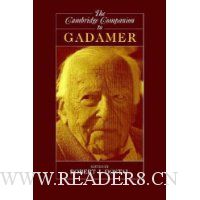
基本信息出版社:Cambridge University Press
页码:332 页
出版日期:2002年01月
ISBN:0521000416
条形码:9780521000413
装帧:平装
丛书名:Cambridge Companions to Philosophy
外文书名:剑桥哲学指南: 伽达默尔
内容简介 Hans-Georg Gadamer (b. 1900) is widely recognized as the leading exponent of philosophical hermeneutics. The essays in this collection examine Gadamer's biography, the core of hermeneutical theory, and the significance of his work for ethics, aesthetics, the social sciences, and theology; his appropriation of Hegel, Heidegger, and the Greeks; and his relation to modernity, critical theory, and post-structuralism.New readers will find this the most convenient and accessible guide to Gadamer currently available. Advanced students and specialists will find a conspectus of recent developments in the interpretation of Gadamer.
编辑推荐 Review
"This twelve-essay collection should introduce Gadamer to new readers while engaging those familiar with his work." Journal of the History of Philosophy "...brings together many themes and conveys difficult thinking with real clarity." Philosophy in Review "...overall, this collection is nicely judged and well-organized, and the inclusion of a very thorough bibliography at the end makes it all the more valuable..." American Catholic Philosophical Quarterly
Review
"This twelve-essay collection should introduce Gadamer to new readers while engaging those familiar with his work." Journal of the History of Philosophy
"...brings together many themes and conveys difficult thinking with real clarity." Philosophy in Review
"...overall, this collection is nicely judged and well-organized, and the inclusion of a very thorough bibliography at the end makes it all the more valuable..." American Catholic Philosophical Quarterly
Product Description
Hans-Georg Gadamer (b. 1900) is widely recognized as the leading exponent of philosophical hermeneutics. The essays in this collection examine Gadamer’s biography, the core of hermeneutical theory, and the significance of his work for ethics, aesthetics, the social sciences, and theology. There is full consideration of Gadamer’s appropriation of Hegel, Heidegger and the Greeks, as well as his relation to modernity, critical theory and poststructuralism.